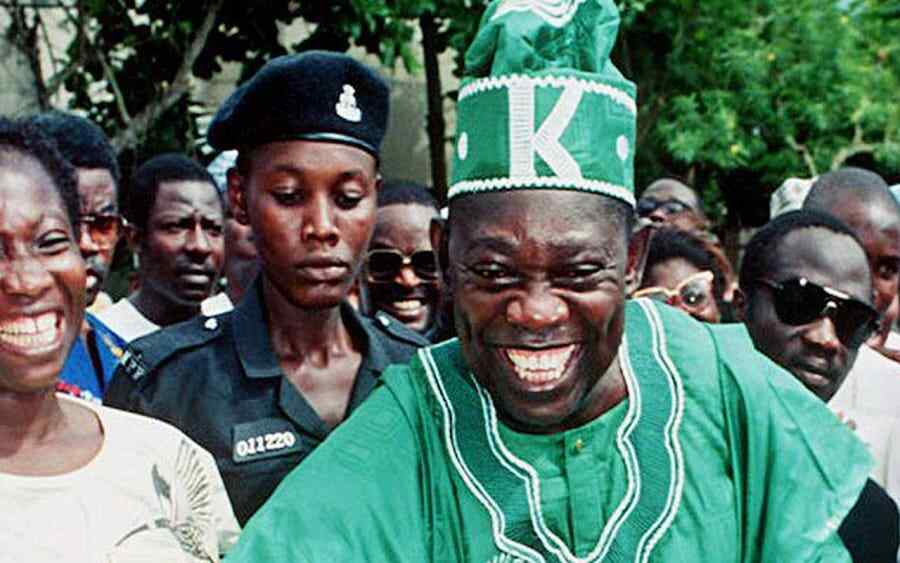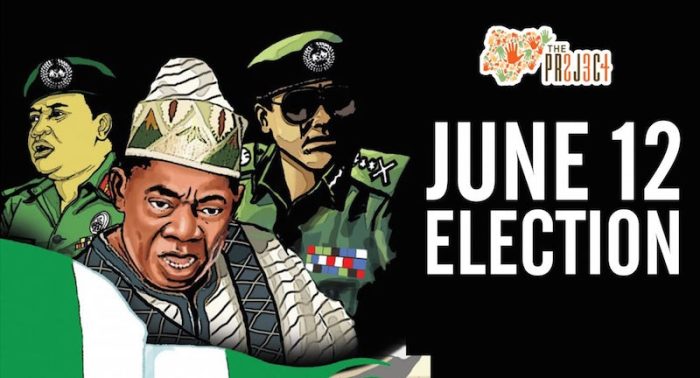Since the return to democracy in 1999, there hasn’t been a political campaign as colourful as that leading to the June 12, 1993 elections.
Those who were not privileged to witness it have heard stories of funfair, pizzazz, drama and spectacle that filled the election.
In hindsight, these are also the elements one would find in a classical tragedy, which was what this episode in Nigeria’s history eventually became.

Like a typical Nollywood drama, the June 12 election featured a protagonist and an antagonist.
The 1993 elections stirred Nigeria towards the democracy it enjoys today.
Till date, MKO Abiola who happened to be the protagonist of the day is celebrated as the hero of democracy.
Hope 93
Nigerians can never forget the June 12 election, not to mention the tragic hero of the day, MKO Abiola who had already won the heart of Nigerians.
Memories of those campaigns comprise of planes flying over Jos and dropping campaign leaflets of “Hope 93” and MKO Abiola’s manifesto, with the “farewell to poverty tagline-his promises of free healthcare for Nigerians and free education, among others.
These flyers and the promises they contained fell like confetti.
Now, fast forward to June 12, 2024.
On this day, Nigeria marks twenty-five years of continuous democratic governance.
As the country celebrates this special day, Nigerians cannot help but remember MKO Abiola, the man who was close to giving them the Nigeria of their dream.
The Life And Times Of MKO Abiola
Indeed, Abiola had joined his ancestors since July 7, 1998, but his name will forever be remembered.
In this article, we will delve into the life and times of MKO Abiola.
After reading this piece till the end, readers will have a background knowledge of Abiola and why his name pops up every June 12.
MKO Abiola, born Moshood Kashimawo Olawale Abiola was born on August 24, 1937, in Abeokuta Colony and Protectorate of Nigeria.
He died on July 7, 1998, in Abuja.
Abiola was a Nigerian business executive, philanthropist, and politician who, till date is hailed as a figure of democratic change in Nigeria.
Education
MKO’s story is that of grass to grace, or should we say, rags to riches.
Abiola was born and raised in poverty but was a hard worker and a bright student.
He attended the University of Glasgow, Scotland, on scholarship, graduating in 1963.
He then studied at the Institute of Chartered Accountants, also in Scotland, graduating in 1965.
Abiola began working for ITT Nigeria in 1968; by 1971 he was its chief executive and chairman, posts he held until 1988.
During that time, he amassed an immense private fortune and became owner of a publishing house, a newspaper syndicate, and an airline, among other enterprises.
The June 12 Election
He was voted International Businessman of the Year in 1988. Abiola made generous donations for building schools, mosques, churches, libraries, and various development projects across Nigeria and became a popular public figure.
After nearly a decade of military rule, democratic elections were held in Nigeria on June 12, 1993.
That was when Abiola inked his name in the history books of Nigeria.
Wondering how? relax, we will give you the gist in details.
You see, that election featured Abiola as a presidential candidate.
He emerged from the Social Democratic Party (SDP) in a two-party race.
Observers declared the election to have been the freest and fairest in Nigerian history.
June 12 Crisis
Initial results indicated that Abiola, who had garnered votes across ethnic and religious divides, would be the clear winner of the election.
But before the official results were announced, something happened.
Also Read: Democracy Day: Facts About June 12 You Probably Didn’t Know
Gen. Ibrahim Babangida, the military leader, annulled the election.
Babangida is another name that cannot be missing when the history of June 12 is discussed.
His announcement provoked a political crisis.
Abiola rallied domestic and international support in claiming the presidency that he appeared to have won, which led to his 1994 arrest on a charge of treason by the military regime then led by Gen. Sani Abacha.
While in prison, Abiola was deprived of outside news.
Abiola’s Mysterious Death
Furthermore, he was subjected to solitary confinement and abuse that included negligent medical care.
His release seemed imminent following the death of General Abacha in June 1998.
However, Abiola died suddenly under mysterious circumstances, arousing suspicions of foul play, although a heart attack was officially declared to be the cause of death.
Nigeria have since observed June 12 as a day on which to commemorate Abiola as well as remember the election that was held on that day in 1993 and its significance as a symbol of democracy.
Happy Democracy Day Nigeria.

